
Here is how to peel and seed tomatoes. If you’ve ever read a recipe that asks for tomatoes, peeled and seeded, you may wonder just how to do that. Taking the skins off (and the seeds out) is great when you’re making tomato sauce or tomato soup. Also when you want to freeze or can a lot of tomatoes from the garden, this tip will come in handy.
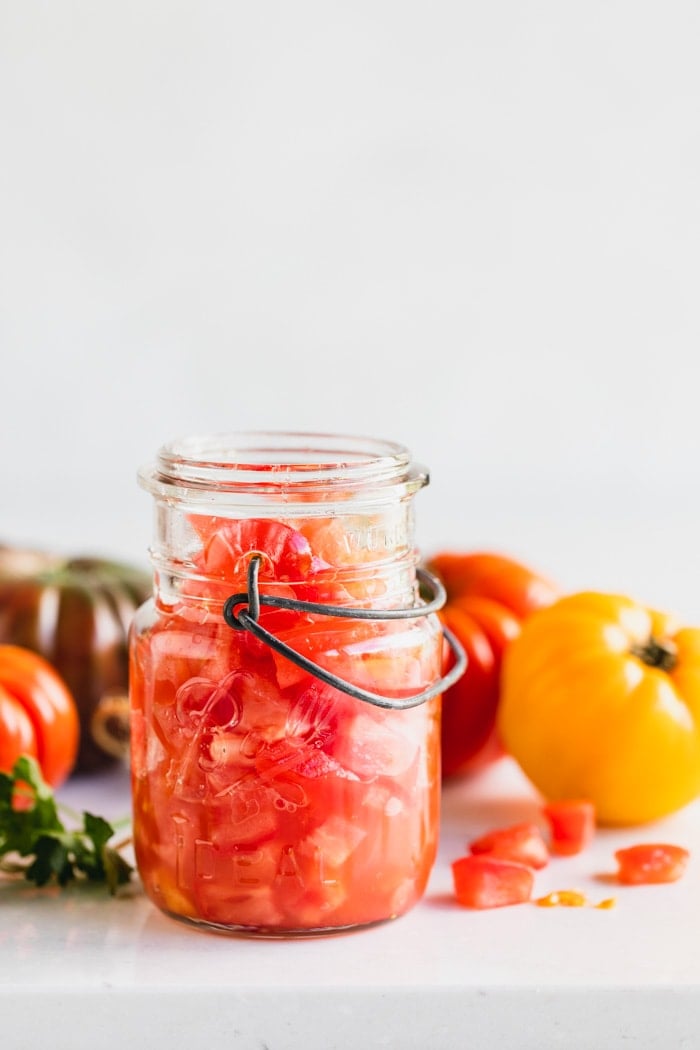
This past spring when we were all stuck at home, with not much to do and a lot to worry about, I turned to seeds. Garden seeds that is. I got online, and started to plan out my summertime garden. It was like a little escape and felt reassuring knowing that I would be able to provide food for my family no matter what the stores had in stock.
When weeks later, my seeds never arrived, I got an email saying that the seed company was so overwhelmed with orders that my seeds wouldn’t be arriving for quite a while. So much for feeling reassured!
I did end up getting my hands on veggie seeds later in April, just in time to plant them as soon as the soil could be worked. Then as soon as the danger of the last frost passed, I planted my tomato plants!
Friends, I know I was not the only one with a story like this. My sister-in-law told me that she had the same experience! She planned to go big, ordered early, had to wait, but got tons of veggies in just in time. Leave me a comment below and let me know what kind of gardening you’ve been doing this year.
I’m guessing you’re probably reading this because you too have a bumper crop of tomatoes! (I’m swimming in them too my friends… among other veggies! Why oh why did I plant four cucumber plants??!!)
It occured to me that I wouldn’t be the only one wanting to have resources for all of the garden fresh tomatoes that would be coming in from our gardens. That’s why I decided to share these tips for How to Peel and Seed Tomatoes so you can freeze them, can them, or use them in soups, chili or stews.
How To Peel and Seed Tomatoes
The process of peeling and seeing tomatoes is so much easier than you may think, and a great thing to do with a large amount of tomatoes. I like to process them all at once so I can freeze them for the wintertime. I’ll walk you through the steps on how to process them.
Set Up Work Area
As with most projects that involve putting food by, setting up your work area is always a good idea.
Clear Counters
I like to make sure my kitchen counter is completely cleared off, since I don’t want to be hassled by clutter getting in my way.
Boiling Water
- You’ll need a large pot of water to peel the tomatoes, and bringing it up to a boil takes a long time. So first thing, get the pot full of cold water, cover it and set it over high heat.
- Set a slotted spoon nearby.
- While the water comes up to temperature you can continue setting up and start the process of prepping the tomatoes.
Ice Bath
- Once you boil the tomatoes, you’ll need to immediately plunge them into an ice bath to stop them from cooking. It’s important to have that set up before you start so the tomatoes won’t overcook.
- Fill a large bowl with ice and then fill it with water. Set it next to your stove.
Set Up Cutting Board
- You’ll need a paring knife to remove the cores and skin from the tomatoes. If you have a tomato shark (a tomato coring tool) you can use that. They come in handy when you’re processing a lot of tomatoes.
- You’ll also want a chef’s knife for halving and dicing the tomatoes. Usually I recommend a tomato knife for tomatoes, but without their skin, they are easier to cut with a chef’s knife.
Bowl and Sieve
Set a sieve over a bowl for catching the juices while you’re seeding the tomatoes. This is particularly helpful if you are canning the tomatoes.
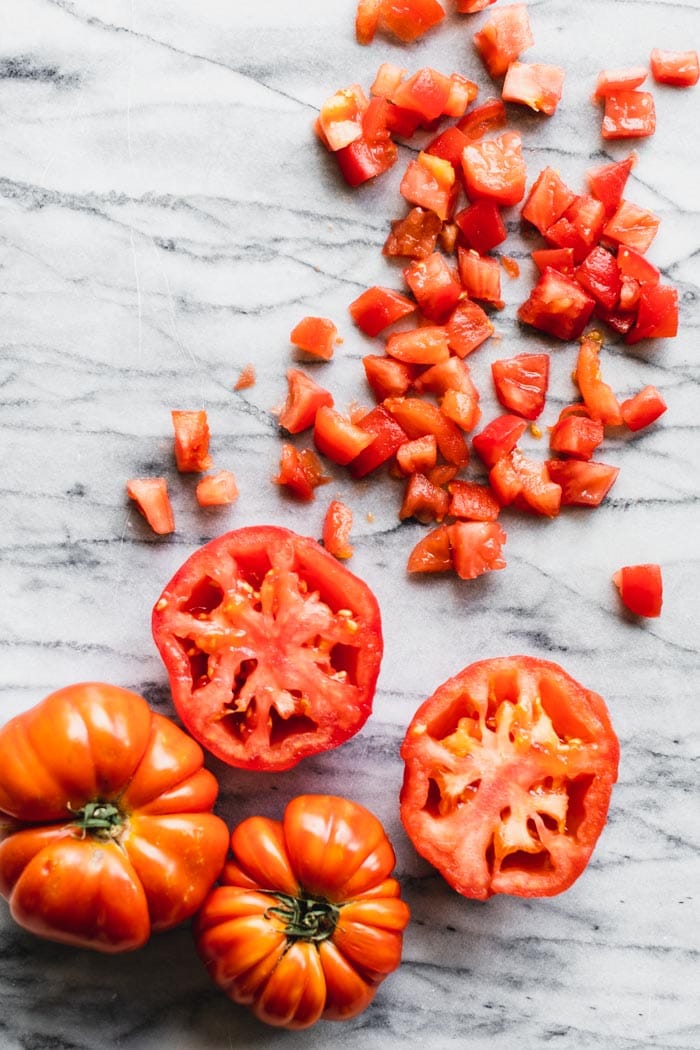
How To Peel Tomatoes
Prep The Tomatoes
- Remove the stem and the cores from the tomatoes.
- Turn the tomato over and score a shallow “x” through the skin on the opposite side.
Blanch The Tomatoes
- Using the slotted spoon, lower the tomatoes one at a time into the boiling water.
- Blanch the tomatoes, for or so at a time, until you notice the skin starting to split, or peel up at the x mark or where the core was removed. This takes about 35 seconds for garden fresh tomatoes. {You should be able to whistle Yankee Doodle twice in this time.} Hot house or underripe tomatoes will take longer to soften.
- Do not boil so long that the flesh of the tomatoes starts to break down.
- Use the slotted spoon to immediately transfer the tomatoes to the ice bath.
Shock The Tomatoes
- Shocking the tomatoes in the ice cold water immediately stops the tomatoes from cooking so they do not become mushy.
- The ice bath also cools them down enough so that they are easy to handle.
- Note: The skin will start to get a little wrinkly at this point because it is almost detaching from the tomato flesh.
How To Remove the Skin From the Tomatoes
- Using the paring knife, start peeling the tomato skin from the flesh at the “x” mark or wherever it naturally has peeled up or split.
- Continue peeling away all of the skin.
- Repeat with the remaining tomatoes.

How To Remove Tomato Seeds
- Cut the tomatoes in half along the equator to reveal the seeds in the center. Conversely, cutting through the stem and blossom end will not open up/reveal the seed chambers.
- Hold the tomato over the bowl with the sieve and gently squeeze the outside of the tomato.
- You’ll likely have to poke some of the tomato seeds out if your tomato isn’t particularly soft or ripe.
Dice the Tomatoes
- Once you have completed peeling and seeding all the batches of the tomatoes, then you can dice them for use or storage.
- I dice them so that I can use them in place of diced canned tomatoes in recipes.
Save the Tomato Juice
- Save the tomato juice from the bowl.
- You can also press the seeds with a silicone spatula to get all the gel to go through the sieve.
Steps To Peel, Seed and Dice Fresh Tomatoes

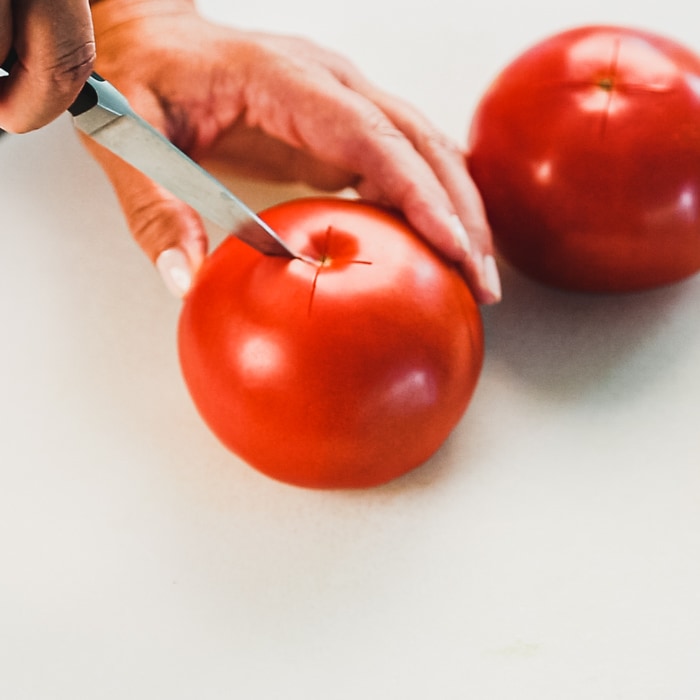

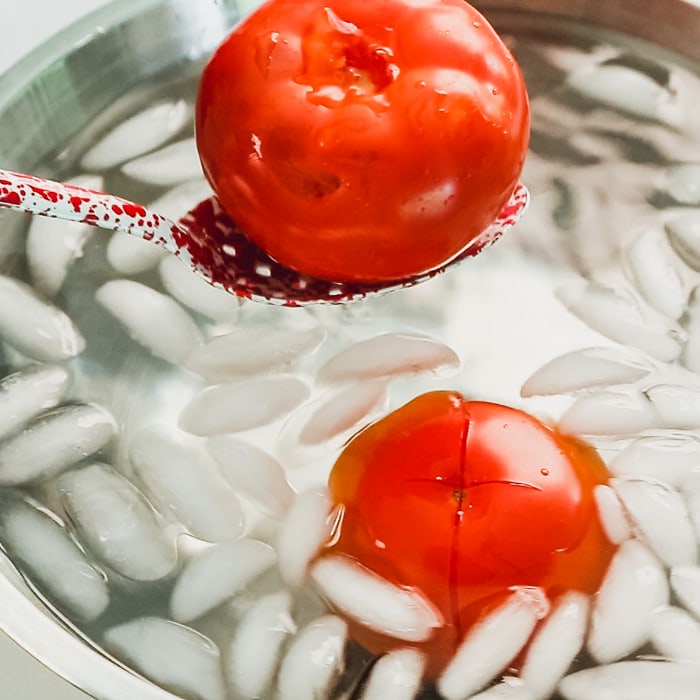
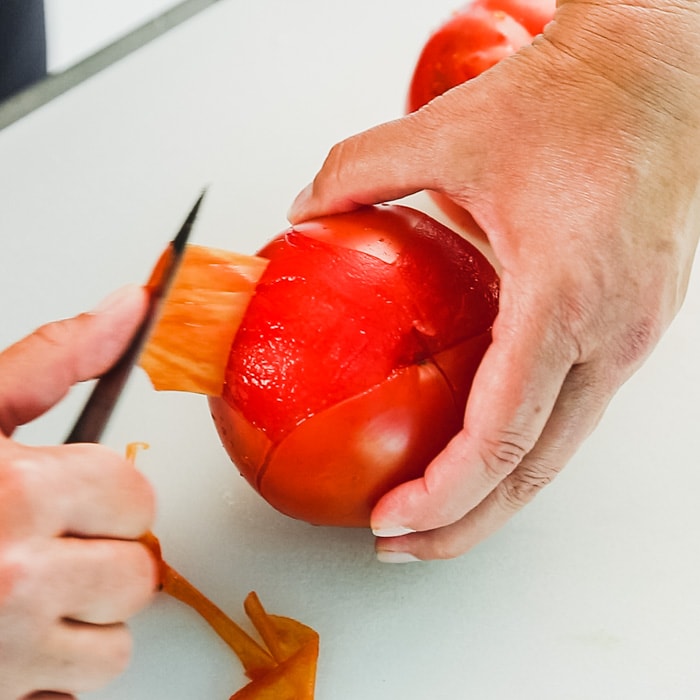
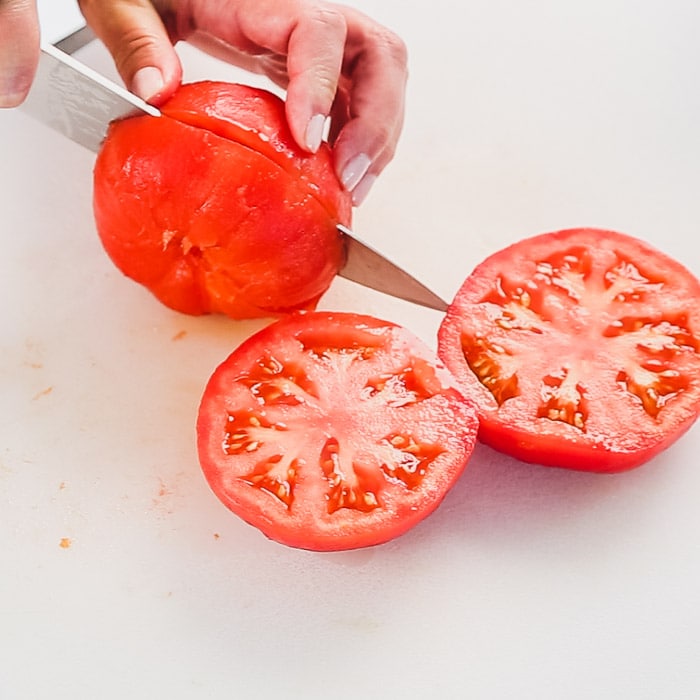
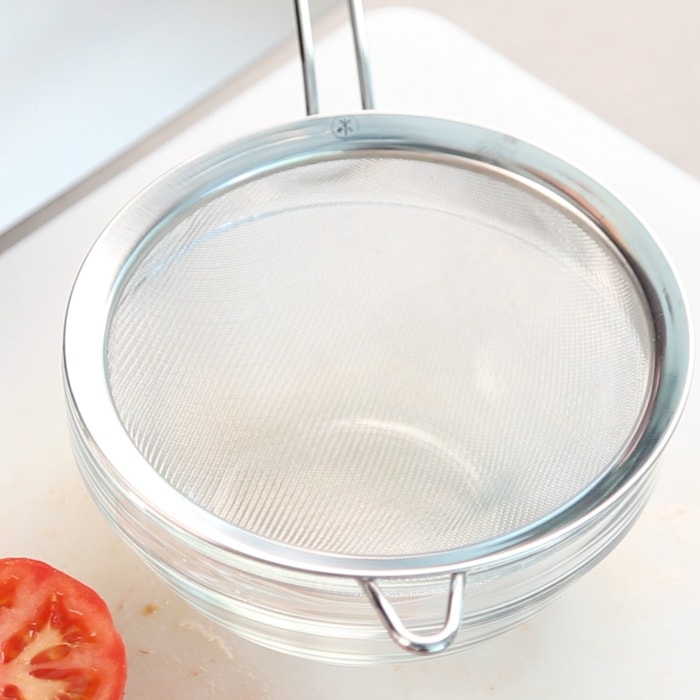

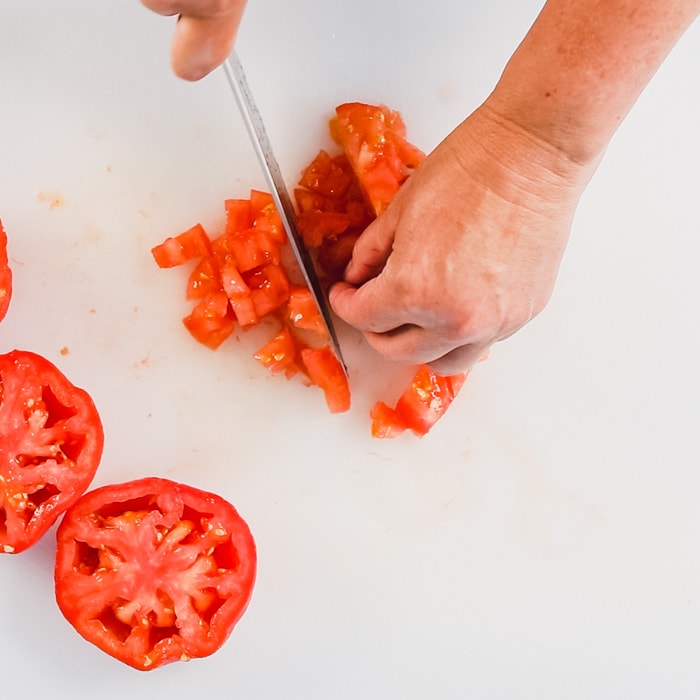
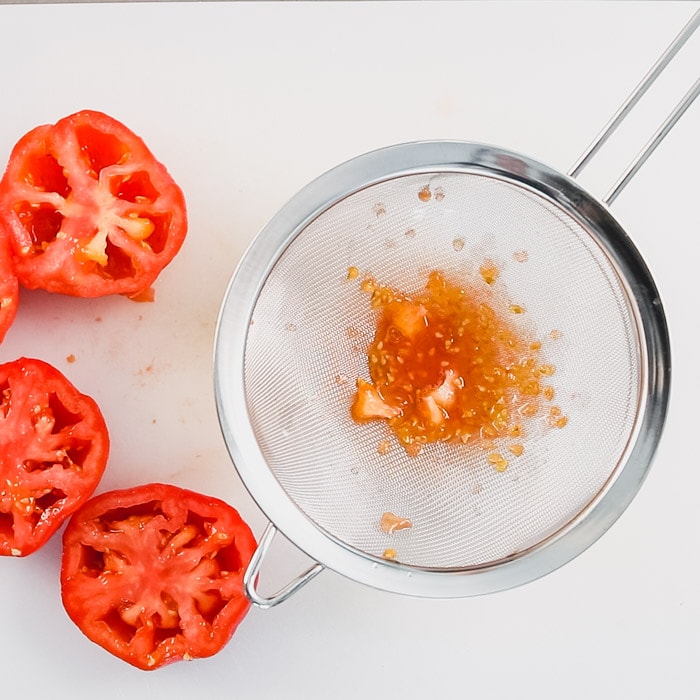
What To Do With Peeled, Seeded and Diced Tomatoes
Once you have processed the tomatoes you can store them for the winter. Here are some ideas and resources for you.
Canning Peeled and Diced Tomatoes
Here is how to Can Tomatoes from Cassie. She explains all you need to know. And trust me, it’s not as intimidating as you may think!
After you have canned to tomatoes, you can use them in recipes such as chili or chicken gumbo.
The nice thing about canning the tomatoes is you can use all wide mouth pint jars so they are easy 1:1 substitutions for the store-bought cans.
How To Freeze Tomatoes
Another option, and in my opinion an easier one, is to freeze the peeld, seeded and diced tomatoes. I like the fact that you don’t need to heat up the kitchen with any more boiling water, and you don’t need to add any citric acid to them. Here’s how to do it:
- Measure out how many cups of diced tomatoes you have.
- You will need 2 cups per bag. Label the bags with a permanent market before you fill them so it is easy to write on them.
- Measure out 2 cups of the diced tomatoes and place them into a 1 quart freezer Ziplock bag.
- Repeat with the remaining tomatoes.
- Then evenly divide the strained tomato juiced among the bags.
- Press out any excess air from the bags as you seal them shut.
- Lay the bags flat in a lasagna pan, one on top the the other.
- Transfer to the lasagna pan to the freezer and let them freeze solid.
- Then remove them from the lasagna pan and keep them frozen up to 9 months.
You can add the diced frozen tomatoes directly to soups or you can thaw them out in the fridge for one day before you need them.

tomatoes on a marble board
Recipes To Use These Diced Tomatoes
How To Cook with Peeled, Seeded and Diced Tomatoes
You can use the pints, or two cup bags of diced tomatoes in place of 15 ounce cans of diced tomatoes. (Or two for 28-ounce cans.) Keep in mind many canned tomatoes have added salt, so you’ll want to add a little extra salt to your recipe to compensate.
Recipe Ideas
- One of my all time favorite recipes, Slow Cooker Chicken Cacciatore, uses a can of diced tomatoes. This is a simple swap! If using frozen, make sure to thaw the tomatoes in advance.
- This creamy cheesy recipe for Shrimp and Grits has a spicy tomato sauce to go with it!
- This Chicken and Okra recipe is an easy Slow Cooker dinner I’ve been making for years. You’ll need the equivalent of a 28-ounce can or 4 cups.
- These vegetarian Sweet Potato and Black Bean Chili Tortilla Bowls are a great recipe for game night or Meatless Monday.
Thanks so much for reading. If you find this blog post and recipe helpful, please let me know by leaving a star rating and review below!
Happy Cooking!
~Katie
Print
how to peel and seed tomatoes
- Author: Katie Webster
- Prep Time: 15 minutes
- Cook Time: 10 minutes
- Total Time: 25 minutes
- Yield: variable
- Category: Pantry
- Method: Stove Top
- Cuisine: American
- Diet: Vegan
Description
Use these step by step instruction on how to peel and seed tomatoes for canning, freezing, sauce or soup. Instructions include a recipe and step by step photos.
Ingredients
- ripe tomatoes
Instructions
- Bring a large pot of water to a boil. Set up an ice bath by filling a large bowl with ice and water.
- Meanwhile, core tomatoes and score a small “X” in the bottom of the tomatoes.
- Add the tomatoes to the boiling water, working in batches if preparing more than four medium tomatoes, and let cook until the skin starts to curl back along the edges. [For garden ripe tomatoes this will happen in about 35 seconds.]
- Transfer the tomatoes to the prepared ice bath with a slotted spoon. When tomatoes are cool, remove them from the ice bath with the slotted spoon.
- Peel the skins off the tomatoes with a paring knife.
- Cut tomatoes in half along the equator exposing seeds.
- Set a sieve inside a bowl. Squeeze tomato seeds out into the sieve. The juices will collect in the bowl below. It may be necessary to poke the seeds out with your finger to get them all out.
- Press any juice out of the seeds through the sieve. Discard seeds and skins. The juice in the bowl can be used in recipes, canning or in place of vegetable broth.
- Chop tomatoes as desired.
Notes
The same method thorough step 5 works for peeling fresh ripe peaches as well.
Nutrition
- Serving Size: 1/2 cup chopped tomatoes
- Calories: 16
- Fat: 0 g
- Carbohydrates: 3.5 g
- Fiber: 1 g
- Protein: .7 g

